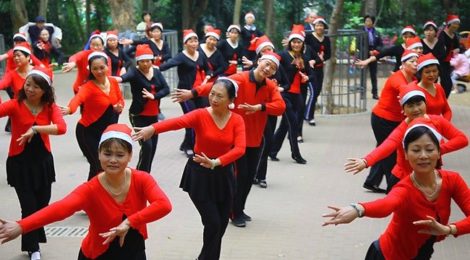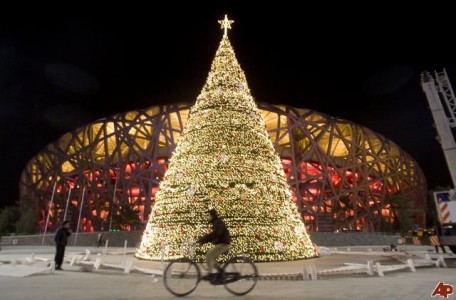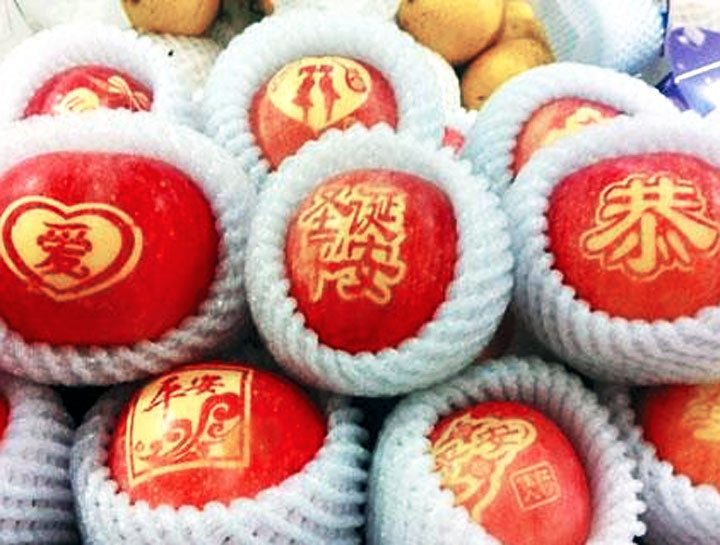
Staying in China for Christmas? Not too bad after all
Christmas in one of the greatest religious festivals and a widely-spread holiday celebrated by millions of people around the world, especially in western countries.
There are an estimated 72 to 92 million Christians in China (30-50 million unregistered and 30 million registered Protestants; 6 million unregistered and 6 million registered Catholics), the second largest faith group behind Chinese Buddhists. Christmas is not an official holiday in China, so most offices, schools, and shops remain open. Nonetheless, many people still get in the holiday spirit during Christmas time. In Chinese, Happy/Merry Christmas is ‘shèng dàn kuài lè’ (圣诞快乐) and Santa is known as ‘shèng dàn lǎo rén’ (圣诞老人). It’s not uncommon to see a Santa Claus at malls and hotels in China. While Chinese children do not leave out cookies and milk for Santa or write a note requesting gifts, many enjoy such a visit with Santa.
Thanks to the frequent communication with the West, more and more Chinese, especially the younger generations, have started to celebrate the festival. In recent years, it has become more popular in the non-Christian world, including Hong Kong, Macau, Malaysia, Singapore and other areas in Asia. Young people in China celebrate Christmas in a different way: they go to exciting places with their families, friends and lovers. City centres in major cities are beautifully decorated and young people also like to go to parties, restaurants, bars or KTVs.

Christmas is celebrated by giving gifts to family and loved ones. Christmas cards, gift wrap, and decorations are easily found at large markets and small shops. On Christmas Eve, a sizable minority of Chinese head to church for services in a variety of languages, including Chinese, English, and French. Customs like lighting the Christmas tree, sending cards and gifts, and holding parties are widely popular in major cities in China. However, if people do have a tree it is normally a plastic one and might be decorated with paper chains, paper flowers, and paper lanterns. Many international companies and Chinese companies doing business with foreigners hold some activities and give Christmas presents to their employees, especially companies from western countries. Malls, banks, and restaurants often have Christmas displays, Christmas trees, and lights.
Christmas in China is treated more like Saint Patrick’s Day or Valentine’s Day. A growing number of Chinese celebrate Christmas Eve by eating dinners with friends. Traditional Christmas dinners are available at hotel restaurants and Western restaurants. Supermarket chains catering to foreigners sell all the ornaments needed for a home-cooked Christmas dinner. It is also possible to find an East-meets-West dish: the ‘eight treasures duck’ (八宝鸭, bā bǎo yā). It is a whole duck stuffed diced chicken, smoked ham, peeled shrimp, fresh chestnuts, bamboo shoots, dried scallops and mushrooms, undercooked rice, soy sauce, ginger, spring onions, white sugar, and rice wine.
A tradition that’s becoming popular, on Christmas Eve, is giving apples. Many stores have apples wrapped up in coloured paper for sale. People give apples on Christmas Eve because in Chinese it is called ‘píng’ān yè’ (平安夜), meaning peaceful or quiet evening, which has been translated from the carol ‘Silent Night.’ The word for apple in Mandarin is ‘píngguŏ’ (苹果) which sounds like the word for peace. People believe they will have peace in the coming year by eating an apple.

Apart from English carols the Chinese songs you are most likely to hear playing are the Chinese versions of “We Wish You a Merry Christmas”, “Silent Night”, and “Jingle Bells.” Lyric in characters and pinyin, and literal translation of “Silent Night” is shown below.
‘We wish you a Merry Christmas‘
我们祝你圣诞快乐 (x3) Wǒmen zhù nǐ shèngdàn kuàilè We wish you a merry Christmas
祝你新年快乐 Zhù nǐ xīnnián kuàilè Wishing you a happy New Year
把新讯带到 Bǎ xīn xùn dài dào Take the news
每一个角落 Měi yīgè jiǎoluò To every corner
把新年的新讯 Bǎ xīnnián de xīn xùn Take the New Year news
带给你们和我 Dài gěi nǐmen hé wǒ To you and me
Merry Christmas and Happy New Year from the Galilei Institute!




